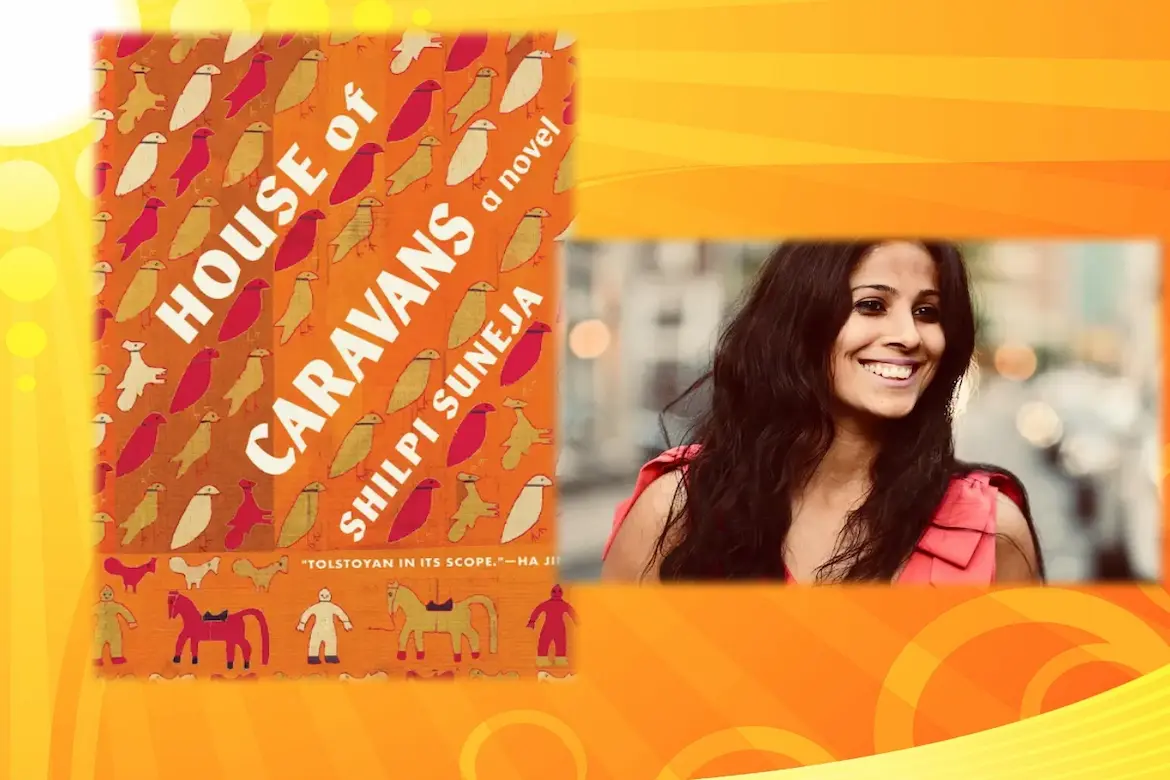Lahore, British India. 1943. A family and nation divided by the living legacy of colonialism.

In this Spotlight on House of Caravans
World War Rages and Resentment of Colonial Rule Grows
House of Caravans is a marvelous debut novel exploring the fractures caused by the Partition of India, as well as the legacy and contemporary parallels of sectarian violence around the world.
About House of Caravans
Lahore, British India. 1943. As World War rages, resentment of colonial rule grows, and with it acts of rebellion. Animated by idealistic dreams of an independent India, Chhote Nanu agrees to plant a bomb intended for the British superintendent of police. Some four years later, following a torturous imprisonment, Chhote flees the city as it descends into violence. Carrying the young son of his murdered wife through scenes of unspeakable bloodshed, he encounters his brother, Barre Nanu, the two of them caught between a vanishing past in the new nation of Pakistan and a profoundly uncertain future in India.
Kanpur, India. 2002. Following the death of his grandfather, Barre Nanu, Karan Khati returns from New York to join his sister in their childhood home, which has been transformed by the embittered Chhote Nanu into a hostel for Hindu pilgrims. When their mother arrives from Delhi, Karan and Ila learn that their fathers were two different men—one Hindu, one Muslim—relationships with both of whom were doomed by familial bias and prejudice, the siblings resolve to reconnect, and to understand the painful twists and turns in the family’s story.
Moving back and forth from the tumultuous years surrounding Partition to the era of renewed global sectarianism following 9/11, this extraordinary historical novel, “Tolstoyan in its scope” (Ha Jin), portrays a family and nations divided by the living legacy of colonialism. Richly evocative, timely, House of Caravans will endure in the ways only the best literature does.
Excerpt from House of Caravans
Prologue | August 1947
Two days after the birth of the nation, Chhote Nanu races toward the Lahore-Amritsar-Lahore express. But before he can shove his way inside, what he sees inside stops him dead in his tracks. He won’t be taking the train to free India. For once he is glad for his lateness. Not glad, no. For the most part, Chhote Nanu is numb. But in a small chamber of his heart, he is pleading with a fate that has spared him once to spare him one more time.
He brackets the golden-haired boy against his body, covers the boy’s eyes. But it’s too late. They have both seen a sight they will never forget. Mothers and fathers, wives and husbands, grandparents and children, especially the children, even the ones in the wombs, all undone. No one stirs. No one is left alive. The train is no longer a train, but a tidal wave of blood. In Punjab, the land of five rivers, a sixth is born.
The boy’s green-blue-green eyes demand an answer. But Chhote Nanu has no words to speak, his throat closed as though over a chicken bone.
The boy’s skin burns with fever, his body shivers like a telegraph needle poised on a piece of bad news. My little boy. Chhote Nanu buries the child’s nose in his neck. A cricket trapper, all knees, and sprightly on most occasions, the boy feels like deadweight, his bones dense with fear. Chhote Nanu feels he could crumble under the weight of a child. His own short legs, bulked from jail labor, won’t stop wobbling.
On the second night of their escape, he runs once again, abandoning the manmade routes of railway lines and roads, toward the lavender and honey predawn sky. In the distance, there are fields of wheat, corn, millet, mustard. No limbs, no cut-off noses, no wide-open eyes.
But to leave the city, they must traverse it again. The old Mall Road, the civil station, the hundred windows of Nedous Hotel. One rainy afternoon, under the blue awnings, the boy had heard Judy Garland on the gramophone. He presses Chhote Nanu’s finger. Do you remember? Chhote Nanu, who remembers, presses back. The city is no longer theirs—new things swallow old ones—stone colonnades disappear behind posters of the national army, which disappear behind banners of the new party that has birthed the new nation. It is best to say goodbye and move on.
ISBN-13: 9781639550142
Publisher: Milkweed Editions
Release date: 09/19/2023
Praise for House of Caravans
“Reminiscent of Zadie Smith’s White Teeth… [a] moving evocation of life before, during, and after Partition and the past’s immeasurable impact on the present.”—Kirkus Reviews
“Suneja weaves a tale that spans generations, centering on the trauma of the Partition and its rippling effects on a family trying to find its way back to one another. This is a promising debut.”—Publishers Weekly
“Told with sumptuous language and epic intensity, House of Caravans is a captivating, harrowing historical saga.”—Foreword Reviews
“Tolstoyan in its scope, House of Caravans is a marvel of a novel. It copes with some major issues of our time, such as the mingling of races, colonization, rebellion, historical violence, migrations, and also love and remembrance. Shilpi Suneja writes with patience, subtlety, and intelligence. She is a genuine artist.”—Ha Jin, author of Waiting
“Grappling with themes of social injustice, immigrant life in the U.S., and the complicated bonds within extended families, Shilpi Suneja’s novel reveals a sincere, informed engagement with matters of political history and of human dignity.”—Daphne Kalotay, author of Blue Hours
“These are characters I won’t forget, they burn with vivacity, and the scenes do too. I am happy to be among them. . . . This is a marvelous story and Shilpi Suneja’s voice livens it up.”—Fanny Howe, author of Love and I
“Straddling two critical time periods of great violence and change on a global scale, Suneja’s novel weaves an intimate tale of two brothers—both brimming with regret, prejudice, sweetness and sorrow—as deftly as a spinner with golden thread. I can’t even begin to fully convey the complexities of this book—its richness, its tenderness, its intelligence—all in a story that pulls you into Suneja’s dreamy imagination. This is a novel that will make you marvel, think, and finally, break your heart.”—Michelle Hoover, author of Bottomland: A Novel
“A tale of kinship, violence, separation, and reunion, House of Caravans is rich and evocative, filled with unforgettable details of India at the end of colonial rule. The Partition is an enormous subject, and this is marvelous storytelling.”—Allegra Goodman, author of Sam: A Novel
“House of Caravans is an astonishing debut—the work of a master writer. Through finely wrought details and clever plotting, Shilpi Suneja illustrates how the reverberations of the 1947 Partition are felt across multiple generations. With her deft writing and her penetrating imagination, Suneja gifts us with a beautiful testament to the power of storytelling.”—Shawna Yang Ryan, author of Green Island
“From intimate love stories to terrorist plots to the political intrigues of 1940s British India, Shilpi Suneja’s absorbing novel introduces a nuanced, sophisticated, and authentic voice that illustrates the human cost of colonialism and resilience of true love. Simultaneously set in 2002 and in the harrowing years before the violent creation of Muslim Pakistan and Hindu-majority India, House of Caravans recounts the story of four generations of a family whose members refuse to be defined by the limitations of their times, who dare to love and befriend across religious and class divides. This is a gorgeous and enjoyable tale, eschewing binary and easy definitions of identity, home, and family.”—Rishi Reddi, author of Passage West
About Shilpi Suneja, Author of House of Caravans

Shilpi Suneja is the author of House of Caravans. Born in India, her work has been nominated for a Pushcart Prize and published in Guernica, McSweeney’s, Cognoscenti, and the Michigan Quarterly Review. Her writing has been supported by a National Endowment for the Arts literature fellowship, a Massachusetts Cultural Council fellowship, a Grub Street Novel Incubator Scholarship, and she was the Desai fellow at the Jack Jones Literary Arts Retreat.
She holds an MA in English from New York University and an MFA in creative writing from Boston University, where she was awarded the Saul Bellow Prize. She lives in Cambridge, MA.
Other LitStack Resources
Be sure and check out other LitStack Spotlights that shine a light on books we think you should read.
As a Bookshop affiliate, LitStack may earn a commission at no cost to you when you purchase products through our affiliate links.

